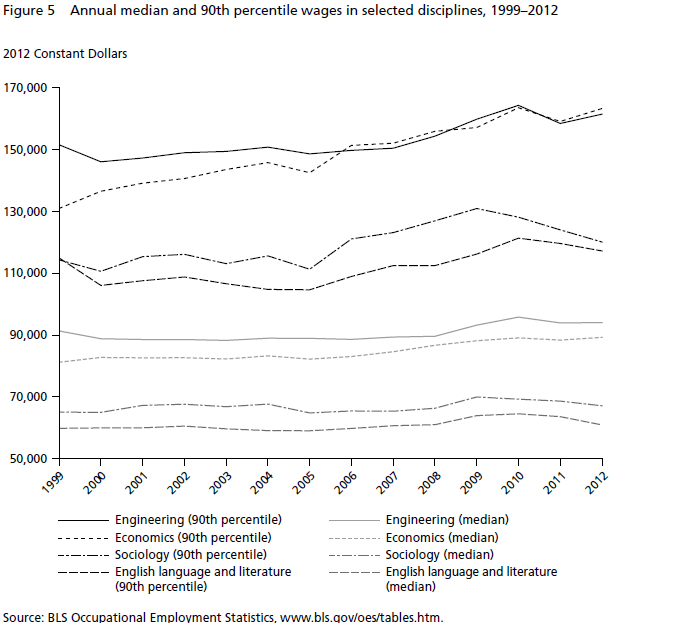Source: Wikimedia Commons
I’ve written about this before (see also here), but I was moved to make this point again after being pointed by Mark Palko to an opinion piece by economist Noah Smith titled “Why Economists Are Paid So Much.”
Smith writes a bunch of things I disagree with — but then, as a political scientist, I guess it’s no surprise to see me disagreeing with an economist! Nonetheless, here goes.
Smith writes:
Part of the rivalry [between economics and sociology] is due to the attempts by some economists, such as Gary Becker, to model phenomena such as discrimination and family life that were traditionally in the realm of sociologists. In the siloed social sciences, people fear such “imperialism.”
“Fear” is a funny word here. Gary Becker’s writing doesn’t scare me, but a lot of it strikes me as wrong, indeed so obviously wrong that it causes me to question how it gets so much respect within the field of economics. I’ve talked with some economists whom I know and respect, and they in turn respect much of Becker’s work, so the story here is far from simple. But let me say this again, my concern about work such as Becker’s — and, I believe, the concern of many other social scientists — is not fear of imperialism, it’s disquiet at such extreme ideas being treated as mainstream.
It would be as if a major field of human endeavor, a highly-respected segment of society, were based on some farfetched principle such as the death wish, or the Oedipus complex, or . . . “rational addiction.” Sure, you can make an argument for any of these theories — each of them makes perfect sense within its theoretical framework — but, ultimately these sorts of theories are most valuable for the reactions they provoke, rather than as serious models of reality.
To continue with Smith’s article: As a statistician, I won’t argue with the rest of it, because he says that economists are paid a lot because they know statistics. Whether or not this is true, I’d certainly like it to be true, so I’ll let someone else try to disagree with that one.
I will say, though, that Freudian psychiatrists got a lot of money and a lot of prestige back in the 1950s, and they didn’t know any statistics at all. But they had one useful skill, and that was the ability to convince rich people that their services were personally valuable. In the national discourse, psychiatrists were taken seriously. They were mocked, but they were a central part of the culture and their pronouncements were respected. And they managed to do so without following Smith’s advice to “stop whining and tech up.”
So perhaps a better piece of advice, if sociologists (and psychologists and political scientists?) want to join economics at the big boys’ table and up their salary and their influence, would be: Stop whining and make your work more appealing to rich people.
P.S. I was amused that Smith described the following graph as “nice”:
I’m not usually one to criticize graphs, but . . .
— It would help to start earlier than 1999; a bit of perspective would be good here.
— What’s with the y-axis labels? Every 20,000 dollars on the odd numbers? That’s just weird.
— And, please, please, please, please: Label the lines on the graph directly! Requiring the reader to decode different sorts of dotted lines; this is just horrible.
(And, yes, I recognize that this graph was made not by Smith but by a group that included a sociologist as well an economist.)




